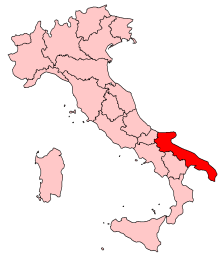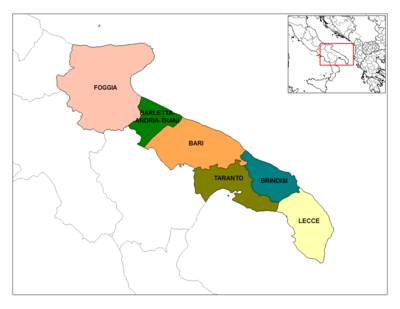Apulia
| Puglia Apulia |
|||
| Flag | Coat of arms | ||
|
|||
| Location | |||
 |
|||
| Time zone | CET/CEST (UTC+1/+2) | ||
| Administration | |||
| Country | Italy | ||
| NUTS Region | ITF | ||
| Capital | Bari | ||
| President | Nichi Vendola (PRC) | ||
| Basic statistics | |||
| Area | 19,366 km² (7,477 sq mi) (Ranked 7th, 6.4 %) |
||
| Population | 4,076,546 (12/2007) (Ranked 7th, 6.8 %) |
||
| - Density | 211 /km² (545 /sq mi) | ||
| Other information | |||
| GDP/ Nominal | € 68.9 billion (2006) | ||
| Website | www.regione.puglia.it | ||
Apulia (from Greek Ἀπουλία, in Italian: Puglia ['puʎːa]) is a region in southeastern Italy bordering the Adriatic Sea in the east, the Ionian Sea to the southeast, and the Strait of Òtranto and Gulf of Taranto in the south. Its southern portion known as Salento, a peninsula, forms a high heel on the "boot" of Italy. The region comprises 19,345 km² (7,469 square miles), and its population is about 4 million. It is bordered by the other Italian regions of Molise to the north, Campania to the west, and Basilicata to the southwest. It neighbors Greece and Albania, across the Ionian and Adriatic Seas, respectively. The region extends as far north as Monte Gargano, and was the scene of the last stages in the Second Punic War.
Contents |
Geography
Puglia is mostly a plain (see Tavoliere delle Puglie); its low coast, however, is broken by the mountainous Gargano Peninsula in the north, and there are mountains in the north central part of the region.
Apulia is divided into six provinces:

- Province of Bari
- Province of Barletta-Andria-Trani
- Province of Brindisi
- Province of Foggia
- Province of Lecce
- Province of Taranto
History

In ancient times only the northern part of the region was called Apulia; the southern peninsula was known as Calabria, a name later used to designate the "toe" of the Italian "boot."
One of the richest in Italy for archeological findings, the region was settled from the 1st millennium BC by several Illyric and Italic peoples. Later, the Greeks expanded until reaching the area of Taranto and the Salento. In the fifth and fourth centuries BC, the Greek settlement at Taras produced a distinctive style of pottery (Apulian vase painting).
Apulia was an important area for the ancient Romans, who conquered it in the 4th century BC but also suffered a crushing defeat here in the battle of Cannae against Hannibal. However, after the Carthaginians left the region, the Romans captured the ports of Brindisi and Taranto, and established dominion over the region. During the Imperial age Apulia was a flourishing area for production of grain and oil, becoming the most important exporter to the Eastern provinces.
After the fall of Rome, Apulia was held successively by the Goths, the Lombards and, from the 6th century onwards, the Byzantines. Bari became the capital of a province that extended to modern Basilicata, and was ruled by a catepano (governor), hence the name of Capitanata of the Barese neighbourhood. From 800 on, Saracen domination in the area was intermittent, but Apulia was mostly under Byzantine authority until the 11th century, when the Normans conquered it with relative ease.
Robert Guiscard set up the duchy of Apulia in 1059. After the Norman conquest of Sicily in the late 11th century, Palermo replaced Melfi (just west of present day Apulia) as the center of Norman power, and Apulia became a mere province, first of the Kingdom of Sicily, then of the Kingdom of Naples. From the late 12th to early 13th centuries, Apulia was a favorite residence of the Hohenstaufen emperors, notably Frederick II. After the fall of the latter's heir, Manfred, under the Angevine and Aragonese/Spanish dominations Apulia became largely dominated by a small number of powerful landowners (Baroni). In 1734 there were the battle of Bitonto, a Spanish victory over Austrian forces. The coast was occupied at times by the Turks and by the Venetians. The French also controlled the region in 1806-1815, resulting in the abolition of feudalism and the reformation of the justice system.
Liberation movements began to spread in the 1820s. In 1861, with the fall of Two Sicilies, the region joined Italy. Social and agrarian reforms that had proceeded slowly from the 19th century accelerated in the mid-20th century.
The characteristic Apulian architecture of the 11th–13th centuries reflects Greek, Arab, Norman, and Pisan influences. Universities are located in Bari, Lecce and Foggia.
Economy
Farming was the chief occupation, but industry has expanded rapidly. Farm products include olives, grapes, cereals, almonds, figs, tobacco, and livestock (sheep, pigs, cattle, and goats). Manufactured products include refined petroleum, chemicals, cement, iron and steel, processed food, plastics, and wine. Fishing is pursued in the Adriatic and in the Gulf of Taranto. The scarcity of water has long been an acute problem in Apulia, and it is necessary to carry drinking water by aqueduct across the Apennines from the Sele River in Campania. Services and mass tourism are increasingly replacing agriculture as the main resources of the region, so Puglia is often called "Florida of Italy".
Politics
Apulia is traditionally a right wing region; despite this at the 2005 regional elections a Communist, Nichi Vendola, was elected as the region's President. At the April 2006 elections, Apulia gave about 51.54% of its votes to Silvio Berlusconi, and at the April 2008 election apulians gave about 47% of their votes to the People of Freedom-led coalition, eleven points more than to the Democratic Party-led coalition.
Demographics
Population has stood at 4 million since the early 1990s; a drop in the birth rate during the 80s, once among the highest in Italy, has taken the region almost to zero growth.






Towns of Apulia with a population of 50,000 or more:
| Comune | Population (2007 est.) |
|---|---|
| Bari | 323,856 |
| Taranto | 195,964 |
| Foggia | 153,402 |
| Andria | 98,594 |
| Lecce | 94,210 |
| Barletta | 93,431 |
| Brindisi | 90,175 |
| Altamura | 68,062 |
| Molfetta | 59,859 |
| Cerignola | 58,147 |
| Manfredonia | 57,237 |
| Bitonto | 56,420 |
| San Severo | 55,632 |
| Bisceglie | 53,956 |
| Trani | 53,550 |
Language
The official national language (since 1861) is Italian. However, as a consequence of its long and varied history, other historical languages have been spoken in this region for centuries. In the northern and central sections, some dialect of the Neapolitan language are spoken: for example the Barese, spoken in the zone of Bari or Foggiano near Foggia. In the southern part of the region, dialects of the Sicilian language called Tarantino and Salentino are spoken. In isolated pockets of the Southern part of Salento, a dialect of modern Greek called Griko,[1] is spoken by just a few thousand people. A rare dialect of the Franco-Provençal language called Faetar is spoken in two isolated towns in the Province of Foggia. In a couple of villages, the Arbëreshë[2] dialect of the Albanian language has been spoken since a wave of refugees settled there in the 15th century by a very small community. The Messapic language formerly spoken in the region was extinct by the 1st century BC due to the Romanization/Latinization of this area which took place after the definitive conquest of the region by the Romans during the 3rd century BC (see Punic Wars).
Use in Popular Culture
Puglia is mentioned in the popular Italian song by CapaRezza 'Vieni a Ballare in Puglia' (Come to Dance in Puglia) featured on his album 'Le Dimensioni del mio Caos' (The Dimensions of my Chaos).
Citations
References
See also
- Capitanata
- Tavoliere delle Puglie
- Gargano
- Gravina in Puglia
- Salento
- Terra d'Otranto
- Murgia
- Trullo
- Nardò
- Santa Maria al Bagno
External links
Italian
|
|||||


